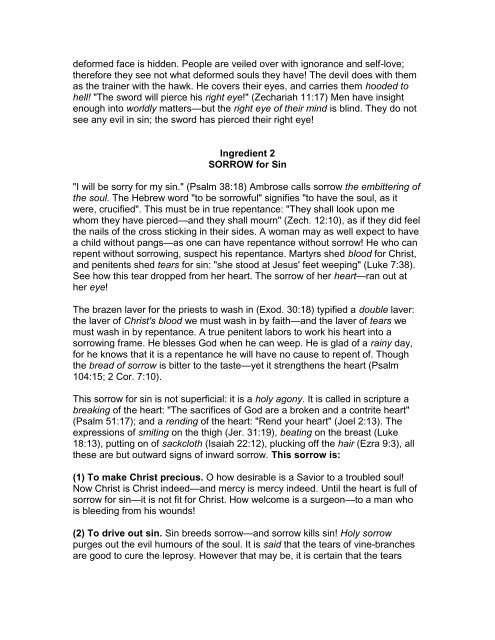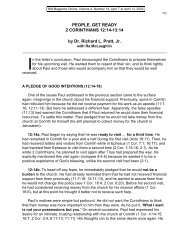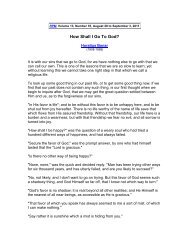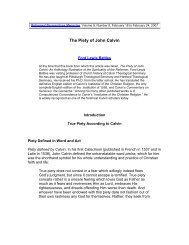The Doctrine of Repentance - Reformed Perspectives Magazine
The Doctrine of Repentance - Reformed Perspectives Magazine
The Doctrine of Repentance - Reformed Perspectives Magazine
You also want an ePaper? Increase the reach of your titles
YUMPU automatically turns print PDFs into web optimized ePapers that Google loves.
deformed face is hidden. People are veiled over with ignorance and self-love;<br />
therefore they see not what deformed souls they have! <strong>The</strong> devil does with them<br />
as the trainer with the hawk. He covers their eyes, and carries them hooded to<br />
hell! "<strong>The</strong> sword will pierce his right eye!" (Zechariah 11:17) Men have insight<br />
enough into worldly matters—but the right eye <strong>of</strong> their mind is blind. <strong>The</strong>y do not<br />
see any evil in sin; the sword has pierced their right eye!<br />
Ingredient 2<br />
SORROW for Sin<br />
"I will be sorry for my sin." (Psalm 38:18) Ambrose calls sorrow the embittering <strong>of</strong><br />
the soul. <strong>The</strong> Hebrew word "to be sorrowful" signifies "to have the soul, as it<br />
were, crucified". This must be in true repentance: "<strong>The</strong>y shall look upon me<br />
whom they have pierced—and they shall mourn" (Zech. 12:10), as if they did feel<br />
the nails <strong>of</strong> the cross sticking in their sides. A woman may as well expect to have<br />
a child without pangs—as one can have repentance without sorrow! He who can<br />
repent without sorrowing, suspect his repentance. Martyrs shed blood for Christ,<br />
and penitents shed tears for sin: "she stood at Jesus' feet weeping" (Luke 7:38).<br />
See how this tear dropped from her heart. <strong>The</strong> sorrow <strong>of</strong> her heart—ran out at<br />
her eye!<br />
<strong>The</strong> brazen laver for the priests to wash in (Exod. 30:18) typified a double laver:<br />
the laver <strong>of</strong> Christ's blood we must wash in by faith—and the laver <strong>of</strong> tears we<br />
must wash in by repentance. A true penitent labors to work his heart into a<br />
sorrowing frame. He blesses God when he can weep. He is glad <strong>of</strong> a rainy day,<br />
for he knows that it is a repentance he will have no cause to repent <strong>of</strong>. Though<br />
the bread <strong>of</strong> sorrow is bitter to the taste—yet it strengthens the heart (Psalm<br />
104:15; 2 Cor. 7:10).<br />
This sorrow for sin is not superficial: it is a holy agony. It is called in scripture a<br />
breaking <strong>of</strong> the heart: "<strong>The</strong> sacrifices <strong>of</strong> God are a broken and a contrite heart"<br />
(Psalm 51:17); and a rending <strong>of</strong> the heart: "Rend your heart" (Joel 2:13). <strong>The</strong><br />
expressions <strong>of</strong> smiting on the thigh (Jer. 31:19), beating on the breast (Luke<br />
18:13), putting on <strong>of</strong> sackcloth (Isaiah 22:12), plucking <strong>of</strong>f the hair (Ezra 9:3), all<br />
these are but outward signs <strong>of</strong> inward sorrow. This sorrow is:<br />
(1) To make Christ precious. O how desirable is a Savior to a troubled soul!<br />
Now Christ is Christ indeed—and mercy is mercy indeed. Until the heart is full <strong>of</strong><br />
sorrow for sin—it is not fit for Christ. How welcome is a surgeon—to a man who<br />
is bleeding from his wounds!<br />
(2) To drive out sin. Sin breeds sorrow—and sorrow kills sin! Holy sorrow<br />
purges out the evil humours <strong>of</strong> the soul. It is said that the tears <strong>of</strong> vine-branches<br />
are good to cure the leprosy. However that may be, it is certain that the tears







